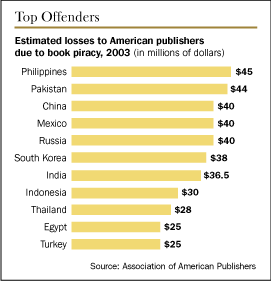 When I read "Waging war against book piracy" by Blooey Singson (Philippine Daily Inquirer, 17 July 17 2005), I decided that I would be writing about it because I did, in fact, photocopy entire books as recently as last year, when I was studying for the librarian's licensure exam.
When I read "Waging war against book piracy" by Blooey Singson (Philippine Daily Inquirer, 17 July 17 2005), I decided that I would be writing about it because I did, in fact, photocopy entire books as recently as last year, when I was studying for the librarian's licensure exam.
And then I read "My Little Heroes, Page 3," where Bugsybee wrote about a student who copied whole sections of a library book by hand because he couldn't afford to photocopy it (never mind buying the book), and "book piracy," where Dean Alfar discusses the issue from the points of view of the user who can't afford to buy the book and the writer who has to protect his intellectual property.
So, instead of the short post that I was thinking of writing, I decided that I had to do some research and come up with something more substantial. That's how I found "Don't Steal This Book" by Burton Bollag (Chronicle of Higher Education, 2 April 2004) and the table shown above, where the Philippines is shown as the top offender as of 2003. The Philippines has since been overtaken on the Priority Watchlist for Books by Pakistan and China according to the 2005 Special 301 Report (pdf) of the International Intellectual Property Alliance. More specific findings may be found in the country report (pdf) on the Philippines.
But what exactly is the law being violated when entire books are photocopied? It's called the Intellectual Property Code of the Philippines, or Republic Act No. 8293, specifically the Law on Copyright. Many mistakenly believe that Presidential Decree No. 285 (as amended by Presidential Decree Nos. 400 and 1203), which authorizes the reprinting of books "for a limited period and only for the purpose of making the same available to the people at reasonable cost," is still in effect. This presidential decree, however, was repealed when the Intellectual Property Code was enacted in 1997.
For related laws and other resources, see the Intellectual Property Brief at the Chan Robles Virtual Law Library. Other relevant articles are "RP Incapable of Curbing Book Piracy Yet" by Carlo June Panila and "10 Big Myths about copyright explained" by Brad Templeton.
And then, for the bloggers reading this, there's "Are You a Copyright Criminal?" by Dave Zielinski (Presentations, June 1999), which says that, "lifting clip art, fonts, icons, stock photos, WAV sound files or any other content from a Web site... without written permission or a license to do so, is clear copyright infringement."
Finally, no, I do not have a definite opinion on this yet. All I can say is that we should follow the Constitution and let the President be impeached... Oops, but that's another issue altogether =)
skip to main |
skip to sidebar

Quick Links: Talumpati | Licensed Librarians | Filipiniana Online | Stereotypes | Leadership | The Philippines

I can't change
Filipino librarians,
but I can change the way
you look at us.
Label Cloud
Archives
-
▼
2005
(250)
-
▼
July
(34)
- Meme: Books I Own and Love
- "Useless" Controversy?
- Sarcasm
- 105 ‘useless’ librarians?
- The Great Raid
- SLA 2005: Epilogue
- SLA 2005: University of Toronto Libraries
- SLA 2005: Exhibits
- SLA 2005: Click University
- FO: State of the Nation Address
- SLA 2005: Career Guidance
- SLA 2005: Networking
- Bloggers on TV
- The Principal Factor
- Photocopying, Copyright and Libraries
- National Children's Book Day
- A Tragic Death in Harry Potter and the Half-Blood ...
- Search Filipino Librarian
- Harry Potter!!!
- Updates on Previous Posts
- Serving the Customer
- Real Life
- SLA 2005: Giveaways
- SLA 2005: Maximizing the Internet
- Librarian's Center?
- For Harry Potter Fans
- SLA 2005: Proudly Filipino
- SLA 2005: Justifying the Library's Existence
- SLA 2005: Awarding
- The Camp John Hay Library
- SLA 2005: General Sessions
- Events
- For Blogger Users
- FO: INQ7.net
-
▼
July
(34)
